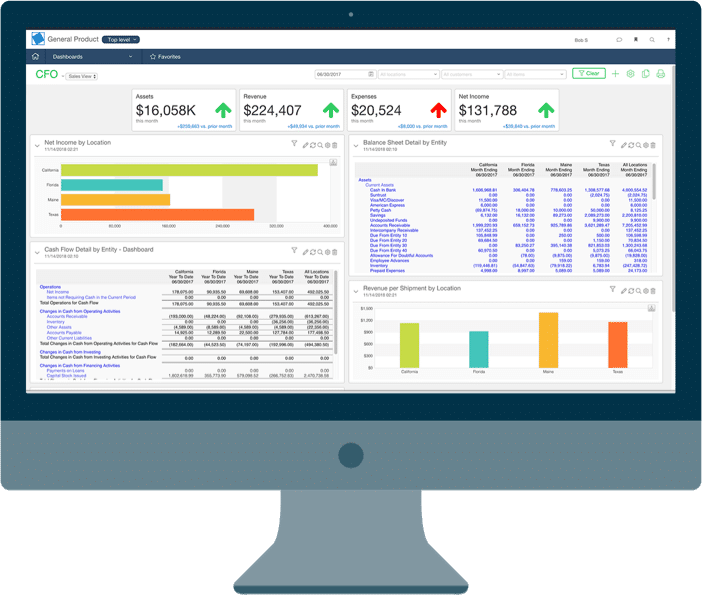The recent introduction of new leasing standards such as ASC 842 and IFRS 16 has significantly impacted private companies, requiring them to change their approach to lease management.
One of the most notable changes brought about by these standards is the requirement to show right-of-use assets on the balance sheet.
The complexity of lease accounting has significantly increased, emphasizing the growing significance of a software solution to effectively manage leases.
In this article, we will discuss the disadvantages of using spreadsheets or manual processes, the benefits of using cloud-based lease accounting software, the importance of tracking lease calculations and fixed asset depreciation side-by-side, and the need to integrate lease accounting software with other accounting and tax platforms.
Cloud-based lease accounting software
The traditional method of managing leases has been through the use of spreadsheets or manual processes, but this approach is no longer feasible due to the increased complexity of lease accounting.
Spreadsheets are prone to errors and are time-consuming to update, while manual processes cannot provide the level of accuracy required to meet the new standards.
Cloud-based lease accounting software offers numerous benefits over traditional methods.
First, such software is accessible from anywhere, so you can access the data from any location.
Second, the data is stored on a server that is maintained by the software provider, making it much more secure than spreadsheets.
Third, the software is typically updated automatically, ensuring you always have the latest version.
Fourth, it is easier to collaborate with other users, as multiple users can access the same data in real-time.


Still using spreadsheets for lease accounting?
Another key benefit of lease accounting software is that it can provide greater visibility into a company’s lease portfolio.
With a spreadsheet-based approach, it can be difficult to quickly and easily see the details of a company’s leases, such as the remaining lease term or the total lease cost.
Lease accounting software, on the other hand, can provide real-time reporting and analytics that can help companies better understand their lease portfolio and make more informed decisions.
Lease accounting software can also provide the ability to track lease calculations and fixed asset depreciation side by side.
This allows you to get a complete picture of your leases and their impact on your financial statements.
It also makes it easier to track lease obligations and ensure that all lease payments are accounted for accurately.
Another benefit of lease accounting software is the ability to integrate it with other accounting and tax platforms.
This streamlines your accounting processes, reducing the risk of errors and ensuring your financial statements are accurate and up-to-date.
Finally, lease accounting software can be more cost-effective in the long run compared to using spreadsheets.
While spreadsheet-based lease accounting may be less expensive initially, the costs of managing and maintaining a spreadsheet-based system can add up over time, especially as a company’s lease portfolio grows.
Lease accounting software, on the other hand, is designed to scale with a company’s needs, making it a cost-effective option in the long run.
AssetAccountant – saving you from spreadsheets since 2019
Overall, lease accounting software can provide a number of benefits compared to calculating leases using spreadsheets.
By automating many of the calculations and processes required for lease accounting, providing greater visibility into a company’s lease portfolio, and helping companies stay compliant, lease accounting software can save companies time, effort, and money.
It’s recommended that companies evaluate and choose lease accounting software that fits their specific needs and budget. Many software providers offer free trial or demo versions, companies can take advantage of this to have a better understanding of the software capabilities and decide if it will be helpful for them.
In conclusion, the recent changes brought about by the new leasing standards have made lease accounting much more complex. Using lease accounting software is now more important than ever to ensure your financial statements are accurate and up-to-date, and that you are fully compliant with the new standards.
Cloud-based software offers numerous benefits over manual processes and spreadsheets, including improved accuracy, ease of use and cost savings.
We take depreciation and leasing seriously
We undertake detailed modelling of fixed asset depreciation and lease calculation rules for both accounting and tax.
We monitor changes to ATO tax rulings and accounting standards like IAS 16 and IFRS 16 so you don’t have to.
And, of course, we are ISO27001 certified.
We take depreciation and leasing seriously
We undertake detailed modelling of fixed asset depreciation and lease calculation rules for both accounting and tax.
We monitor changes to IRS tax rulings and accounting standards like US GAAP and ASC 842 so you don’t have to.
And, of course, we are ISO27001 certified.
We take depreciation and leasing seriously
We undertake detailed modelling of fixed asset depreciation and lease calculation rules for both accounting and tax.
We monitor changes to IRD tax rulings and accounting standards like IFRS 16 so you don’t have to.
And, of course, we are ISO27001 certified.
We take depreciation and leasing seriously
We undertake detailed modelling of fixed asset depreciation and lease calculation rules for both accounting and tax.
We monitor changes to tax rulings and accounting standards like IFRS and US GAAP so you don’t have to.
And, of course, we are ISO27001 certified.
Why our clients love AssetAccountant


Fantastic product - has literally saved me hours of work.


Ever wanted the big company fixed asset system without all the clunkiness and overthinking on the part of the software developers (I'm looking at you Thomson Reuters...)? Well then you need AssetAccountant. It provides just the right mix of complex depreciation calculations and beautiful user interface. It's a system designed by accountants and executed perfectly by developers. The integration is seamless with Xero (you can sign into AA with Xero credentials which is awesome if you are already running Xero on your browser) and journaling synchs are very flexible between the two applications. Then there is the price. I challenge you to find a more robust fixed asset system at these price points. Well done AssetAccountant.
You get me.
I now have my big boy jocks back on for fixed asset management....and they fit!









Ready to kick some assets?
- AssetAccountant is fixed asset software that automates fixed asset depreciation & lease accounting and posts their journals to the General Ledger.
- AssetAccountant combines detailed interpretation of Tax and Accounting rules with a modern user interface design, to simplify the process of creating and maintaining your fixed asset register.
- AssetAccountant is sophisticated enough for Wall Street, user-friendly enough for main street.
- AssetAccountant is for worldwide application 🌎













































